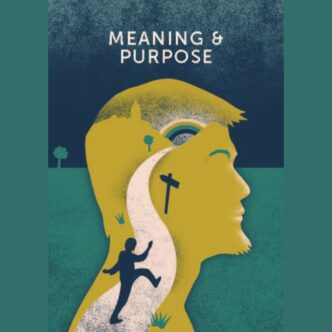Meaning & Purpose: The key to resilience
Staying well – we know we need the right diet and regular exercise. But the emotional need for meaning and purpose is essential too.
The need for meaning and purpose
It may be hard for parents to believe sometimes, but boredom in a small child was not put there by nature to annoy us. Boredom is nature’s way of pushing a child to learn, to be stretched and challenged in ways which give them a sense that they are growing. And, when they are growing, they are mastering the skills and knowledge which will enable them to cope when life sends challenges their way. And our need for meaning and purpose continues beyond childhood to form the warp and weft of our lives.
A lack of meaning and purpose will often voice itself when people are experiencing depression: “I can’t see why I should bother,” “what’s the point in going on?”, or even more concerning, “the world would be better off without me.” If we really listen, this is nature telling us that a person has lost their connection with meaning and purpose in their life. On the other hand, when people have meaning and purpose in their lives it helps them make sense of the adversity we are often faced with; accidents, injuries, bereavements and illness, none of which seem fair or just.
Seeing the meaning when we learn
A huge source of meaning and purpose comes from gaining knowledge and skills. When a person gains understanding or finally cracks mastering a new skill – be it a professional competency, an art or craft, a sporting skills, a language or topic of study – they may exclaim “I see what you mean!” They have literally seen the connection between what they knew before and the new learning, as if they had fresh eyes.
Feeling we are needed
As we are living longer, planning for how we will get meaning and purpose into our lives post retirement and when our children grow up, move away and thrive independently can become more challenging. This can sometimes tip people into depression if they no longer feel needed. To prepare for this possibility, we might seek out opportunities to make a contribution to the needs of others. This may be through volunteering or supporting worthy causes.
Connecting up to something bigger
For some people, meaning and purpose comes through being connected to something bigger than themselves. This can be because they are raising a family, running a business or working to provide a service which other people depend upon. It might also take the form of a quest for meaning and purpose. For some people this might mean involvement with religious or political ideas which help them make meaningful sense of their experiences. It might just as well come from a quest for scientific, philosophical or spiritual truth.
The research shows that when people have these elements in their lives that they are more resilient to stressful life events, and feel more fulfilled in general. It might be worth all of us reflecting on how we can get meaning and purpose into the centre of our lives.











